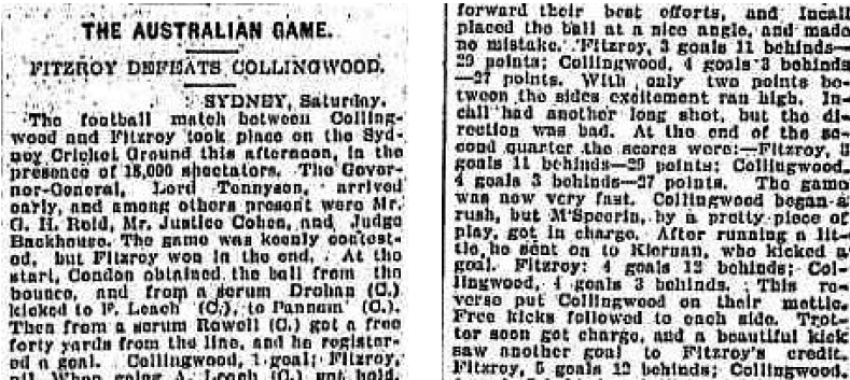MELBOURNE AT COLLINGWOOD. By OBSERVER.
In the earlier stages of the game between Melbourne and Collingwood it looked as if the Reds would put their opponents fairly on their mettle. This was largely due, though, to the fact that Collingwood could not get goals, some fine long shots just landing on the wrong side of the posts, while Melbourne, making the most of their opportunities, were two points ahead at the first change of ends. The points were not at all a reflex of the play.
In the second quarter Collingwood still maintained their general superiority, but could not express it in points, and when early in the third quarter Leith, who had been playing right in goal, was sent forward and scored twice in quick succession, the house team were really alarmed. Their anxiety did not last long, for, rousing themselves to it, they took control of the game, and in a spirited quarter of an hour's football E. Leach, E. Lockwood, Rowell (twice), and Tulloch all scored fine goals, this rapid addition of 30 points putting the issue beyond question. Collingwood's play then was almost monotonous in its perfection the same thing over and over again the ball bounced in the centre, almost invariably secured by Condon, rushed to the Melbourne end by quick and accurate exchanges, and put through.
In the last quarter Melbourne rallied a bit, played it right out to the finish, and, with some fine rushes, added further to their goals, very few chances of scoring being missed. Once again the Collingwood system the deadly accuracy and rapidity of their exchanges, and their success in picking up and high-marking gave them a great advantage over their opponents. Fitzroy evidently understand their system and spoil it time after time, but the other teams do not yet appear to have realised that their only chance with Collingwood is to play them man to man. Whenever the Collingwood place men are left unguarded the accuracy of their clever passing to each other must tell.
When Melbourne got possession in this game it ended generally with one kick, since the ball was dropped into a group where both sides had an equal chance, but when Collingwood got hold they kicked with fine certainty to men left temporarily alone, and so it was passed from hand to hand, the Melbourne fellows always a little too late to check it. In these exchanges the more experienced Collingwood players Condon, Tulloch, Pannam, Drohan, E. Lockwood, and Rowell were always conspicuous.
I have never seen Condon play a better game than on Saturday, his dash, judgement, and unselfishness making him easily the best player on the field. Though Monahan was marking with his usual certainty, and Drohan playing such fine football on one of the wings, that if Fitzroy can reject a player of such capacity they must be very strong indeed. Fred Leech was away from the centre. He was really not well enough to play in Sydney, and, as a consequence, is now severely indisposed. M'Cormack took his place, and played some fine, breezy football. C. Gardiner played a first-rate game against Pannam, beating him repeatedly and it goes without saying that the Melbourne wing man played infinitely the fairer and more manly game of the two. It is a singular coincidence that Pannam exasperates every man who plays against him with his sly and spiteful tricks, yet watches the umpire so carefully that he never gets into trouble. There is less excuse for these petty faults in that Pannam is a very fine player, and quite able to hold his own in a fair tussle.
Rowell was always dangerous forward, his easy, telling place kicks deadly, as usual, in their accuracy, and, knowing it, the side play to him constantly. He accounted for five of the Collingwood goals. Dummett gave a few glimpse of his old form, and Incoll, Angus, and Tulloch were all reliable. Without getting goals, Pears made some very fine shots. For Melbourne, Bremner again played a beautiful game, his fine, clever dashes being always a telling feature. Parkin and M'Clelland, too, were very fine defenders, who put in a tremendous amount of useful work. Amongst their forwards M'Spearin was spoiled only by his want of pace, a bad defect, though, against Collingwood, while Coutie was always smart and persistent. Leith began, as usual, back, where his kicking off was superb, but he was even more useful forward, where he scored three goals. Moodey was cool and useful, as usual. In the ruck, and Langley roved in admirable style.
1903 'FOOTBALL.', The Argus (Melbourne, Vic. : 1848 - 1957), 1 June, p. 9, viewed 31 July, 2015, http://nla.gov.au/nla.news-article9822371


